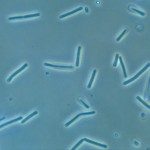Bulletin Epidémiologique Hebdomadaire 18, 127-128.
En 1936, Lemierre décrit une série de décès suite à une septicémie due à une bactérie anaérobie Gram négatif : « Bacillus funduliformis ».
Cette maladie affecte essentiellement les jeunes adultes ou les adolescents en bonne santé sans distinction de sexe.
Elle est initiée par un abcès amygdalien ou périamygdalien non traité ou insuffisamment traité.
Selon Lemierre la septicémie résulte d’une thrombophlébite des veines des amygdales qui s’étend à la veine jugulaire interne ou même aux veines faciales.
Cette pathologie appelée depuis syndrome de Lemierre mais souvent désigné dans les documents cliniques sous le nom de « Syndrome angine phlébite jugulaire – Abcès du poumon » est rarement diagnostiquée depuis l’avènement des antibiotiques.
Cependant, elle reste une infection grave, mettant en jeu le pronostic vital.
Depuis les années 1990, il est signalé à travers le monde et particulièrement en Europe, une résurgence de ce syndrome.
Sa réapparition est probablement due à plusieurs facteurs, tels que la réduction de l’usage des antibiotiques dans les infections oropharyngées, l’amélioration des techniques de cultures et des méthodes d’identification des bactéries anaérobies.
Après un rappel clinique, bactériologique et thérapeutique sur le syndrome de Lemierre, sera présentée l’analyse des souches bactériennes reçues au CNR entre 1998 et 2005.

